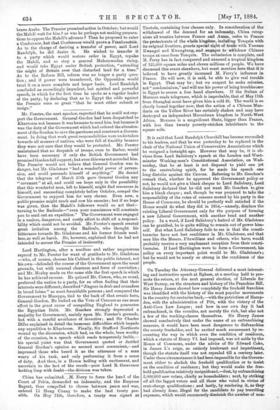Mr. Forster, the next speaker, regretted that he could not
sup- port the Government. General Gordon had been despatched to Khartoum not because it was humane to send him, but because it was the duty of the Government which had ordered the abandon- ment of the Soudan to save the garrisons and construct a Govern- ment. In doing that work great responsibilities were undertaken towards all manner of natives, who were fall of timidity because they were not sure that they would be protected. Mr. Forster maintained that no despatch of troops, even to Berber, would have been necessary if only the British Government had promised Gordon full support; but even this was not accorded him. The Premier would not believe that General Gordon was in danger, but Mr. Gladstone "had a wonderful power of persua- sion, and could persuade himself of anything." He denied that the telegram of March 25th gave General Gordon any " covenant " at all, and could see hope- only in the possibility that this wonderful man, left to himself, might find resources in himself, and succeeding completely before October, compel the Government to support him for very shame. Even now, a public promise might reach and cow his enemies ; but if no hope was given, then the Maluli's followers would so act that— turning to the Radicals—" even your consciences will constrain you to send out an expedition." The Government were engaged in a useless, dangerous, and costly effort to shift all a responsi- bility which could not be avoided. Mr. Forster's speech created great irritation among the Radicals, who thought his bitterness towards Mr. Gladstone and his former friends need- less, as well as harsh. He, however, explained that he had not intended to accuse the Premier of insincerity.


































 Previous page
Previous page